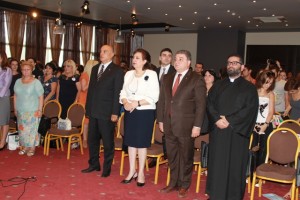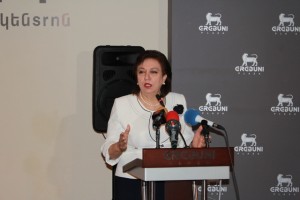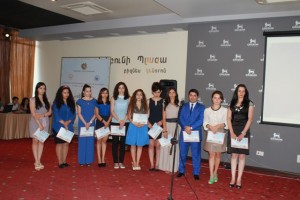“Diaspora” Summer School Program ended with closing ceremony

On July 31, the “Diaspora” Summer School Program of the RA Ministry of Diaspora ended with a solemn closing ceremony. From July 9 to August 1, the RA Ministry of Diaspora and Yerevan State University organized six courses, including Accelerated Armenian Language Courses, Training Courses for Diaspora Armenian Teachers, Courses for Young Diaspora Armenian Leaders, Courses on Armenian Song and Dance, Courses for Diaspora Armenian Journalists and Courses for Leaders of Armenian Communities of the Diaspora.
Greeting the participants of the program and the guests, Minister of Diaspora Hranush Hakobyan attached importance to the role that the annual courses of the “Diaspora” Summer School Program play in assisting in preservation of the Armenian identity. The minister also mentioned that one of the goals of the summer school program is to help the generations of Armenians living under the influence of various cultures in foreign countries, preserve their national identity. “In this short period, you gained more knowledge and acquired more skills, but I believe one of your greatest achievements was making new friends, establishing contacts and relations that will contribute to the gradual establishment of a powerful network, which will go on to become one of the guarantees for preservation of the Armenian identity. I know each of you is proud of your homeland and only wait to hear good news from abroad, but that’s not enough. You have to invest your potential and knowledge and use your contacts to help Armenia develop because Armenia is the Homeland of all Armenians around the world,” the minister particularly mentioned.
Touching upon the issues of national concern, the minister mentioned the following: “Although Armenians are very diverse and unique in the Armenian communities of the Diaspora, it should be mentioned that that diversity is our wealth. We must set our priorities together. Each of us has to fight, make efforts, help strengthen the homeland, settle the Nagorno-Karabakh conflict, contribute to the recognition and condemnation of the Armenian Genocide and unite around the Armenian Church in our respective countries. Each of you must remember and demand, become the Armenians making claims for the Armenian Cause, the Armenians with the legacy of Armenian culture, as well as the guarantors of preservation of the Armenian identity and the mother language. We don’t have the right to stop the struggle.”
Minister Hranush Hakobyan called on everyone to speak in Armenian, stay connected to each other and to the Homeland and visit Armenia often.
The minister touched upon the programs and activities that the Republic of Armenia, as well as benefactors and pan-Armenian organizations have carried out to support the Armenians in states of emergency in Iraq, Syria and Ukraine and to help solve their problems and said all Armenians need to try to make their small contributions to support their compatriots in difficult situations.
Minister Hranush Hakobyan granted certificates to the participants of the program.
Kamo Atayan, representative of the “Diaspora” Summer School Program from Yerevan State University, greeted the participants.
The representatives of all courses performed Armenian national songs and dances, recited poems, shared their compositions and expressed their satisfaction with the implementation of such a major program.
The “Diaspora” Summer School Program was first launched in 2012. Over the years, more and more Diaspora Armenians have been applying to participate in the program, and the program is becoming one of the programs that Diaspora Armenians demand the most.
In 2012, instead of the 70 participants that the organizers were expecting to receive, they received 131 participants from 15 countries. In 2013, the organizers expected to receive 100 participants, but there were 201 Diaspora Armenians from 20 countries. In 2014, instead of the 100 participants, there were 222 Diaspora Armenians from 22 countries. In 2015, 250 Diaspora Armenians participated in the “Diaspora” Summer School Program.
Alongside theory and practice, the participants also took part in cultural events, visited museums, went sightseeing and had meetings.




 Արևելահայերեն
Արևելահայերեն Արևմտահայերեն
Արևմտահայերեն Русский
Русский














